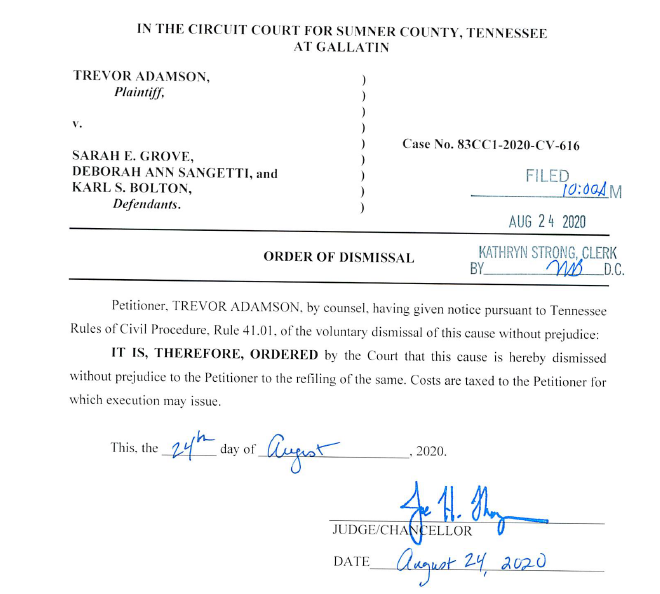Yet another SLAPP-suit has been dismissed in Tennessee—this one a mere 12 days after filing. Once again, the rapid dismissal was made possible by the Tennessee Public Participation Act—Tennessee’s relatively new anti-SLAPP statute—which affords defendants targeted by bogus speech-based lawsuits a wealth of powerful tools to secure (or negotiate) prompt dismissals, recover their attorney’s fees, and obtain sanctions.
In this case, Plaintiff Trevor Adamson—a current congressional candidate—sued three community activists who had criticized his organizing skills on Facebook. Unable to handle their innocuous criticism, he sued them for “not less than $300,000” in supposed compensatory damages and an additional half a million dollars in punitive damages. Adamson also sought a facially unlawful injunction prohibiting his critics from “publishing, disseminating, or posting on social media, or Internet site [sic], or through the use of any written or digital media of any type any reference to any events pertaining to Mr. Adamson’s private life, whether the same are believed by the Defendants to be truthful or otherwise.”
A cursory review of Adamson’s lawsuit revealed that not a single statement over which he had sued was even plausibly defamatory—an essential requirement to avoid dismissal. Worse, the allegations underlying his SLAPP-suit were flagrantly baseless. For example, one of Adamson’s claims was premised upon a defendant expressing concern that Adamson had said “he was happy that violent counter-protestors showed up at an action that was centering LGBTQ+ people.” Despite claiming, under penalty of perjury, that that assertion was “false,” though, in a subsequent Facebook screed bereft of self-awareness, Adamson acknowledged that he had, in fact, said “I’m kind of happy they showed up,” that he had provided specific context for why he was happy, and that he had even secretly recorded the conversation. The fact that Adamson’s fiancée had repeatedly pledged that Adamson would file a defamation lawsuit before Adamson’s asserted (and similarly sworn) claims of damages based on his “serious mental injury” and need for professional treatment could have been realized also did not help matters. See, e.g., McMillin v. Realty Executives Assocs., Inc., No. E2018-00769-COA-R3-CV, 2019 WL 1578704, at *4 (Tenn. Ct. App. Apr. 12, 2019) (issuing sanctions where a plaintiff “filed and maintained an action for slander when he either knew or should have known that he suffered no damages and that such a claim was, therefore, without merit.”).
Faced with the prospect of an anti-SLAPP petition, Adamson filed notice of his intent to dismiss all of his claims barely a week after filing them and was ordered to pay the costs of the lawsuit. Accordingly, out of the $800,000.00 that Adamson sought, he recovered nothing, he paid for the privilege of losing, and he obtained no relief from his SLAPP-suit—a frequent tactic used by thin-skinned plaintiffs to stifle legitimate criticism—at all. The vindicated Defendants’ claims for fees and sanctions remain pending.
“Gert, Karl, and Deborah are pleased that this comically bogus SLAPP-suit filed by an image-obsessed congressional candidate with a history of disturbing behavior has been dismissed immediately,” said attorney Daniel Horwitz, who represented the Defendants. “Adamson and others who seek to stifle protected speech through baseless litigation would be wise to avoid abusing the litigation process again in the future.”
Daniel Horwitz is a free speech lawyer who represents clients across Tennessee. If you would like to purchase a consultation from him, you can do using the form below.
Waiting for PayPal... Validating payment information... Waiting for PayPal... |

Pingback: Happy New Year to the Tennessee Public Participation Act! - The Law Office of Daniel A. Horwitz
Pingback: Happy New Year to the Tennessee Public Participation Act! – Horwitz Law
Pingback: Happy New Year to the Tennessee Public Participation Act! - The Law Office of Daniel A. Horwitz, Esq.